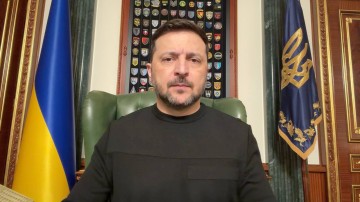In pulling out of the Black Sea Grain Initiative, which made it possible to export Ukrainian agricultural products to the most vulnerable countries in the world, and attacking the port of Odesa, the Russian Federation is setting the stage for a global food crisis. This is stated in a joint article by Oleg Ustenko, an economic advisor to the President of Ukraine, and Simon Johnson, Professor at the MIT Sloan School of Management, former chief economist of the IMF, for the American newspaper Los Angeles Times.
"The consequences will be dire for low-income countries, which are particularly vulnerable to rising grain prices on global commodity markets. If Putin is allowed to pursue this strategy, the likely effect will be economic disruption, increased poverty and more disaster-driven migration around the world," the economists warn.
The experts said that earlier this month, Russia forces destroyed a grain terminal in the port of Odesa by missiles, wiping out storage facilities holding enough grain to feed nearly 300,000 people for a whole year.
"Russia has since blocked the movement of more than two dozen ships that were already loaded with enough Ukrainian grain to feed millions. Russia is not strong enough to conquer Ukraine, but it has enough missiles to close trade in the Black Sea," the article says.
Ustenko and Johnson said that higher grain prices will tend to increase inflation in the United States, the European Union and other rich countries. And in lower-income countries, the potential impact on food prices and supplies will be sufficient to put perhaps 500 million people at significantly increased risk of hunger.
The authors draw attention to the fact that the Russian international propaganda machine is already hard at work, trying to divert blame for the coming crisis.
In the article, the experts insist that the United States, the G7 and the European Union need to prevent food shortages and to keep food prices at a reasonable level, because today there is no way to replace Ukrainian exports by sea.
"The only way to reopen the Black Sea corridor is through a diplomatic agreement with Russia. Pressure from Türkiye can help and did help in 2022. But Russia will ignore the West, unless Putin feels that he may be losing support among developing countries. The United States and Ukraine's other allies need a high-level diplomatic initiative, persuading low-income countries to push Russia to allow Ukraine's grain exports," they believe.
Ustenko and Johnson said that the Russian President's strategy is to hold tens of millions of people hostage by using food as a weapon of war – both in weakening Ukraine's shattered economy and threatening the global grain markets – to exact an even higher price for Ukraine's refusal to capitulate.
"The governments of poorer countries need to demand that Ukrainian grain be allowed to flow freely. The Black Sea corridor must be reopened and kept open as a top priority for all parties working to defeat Putin," the authors of the article said.



